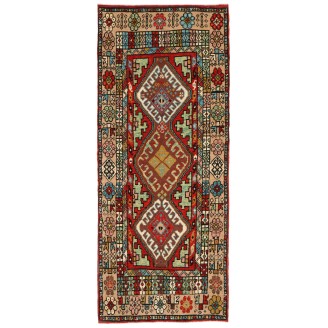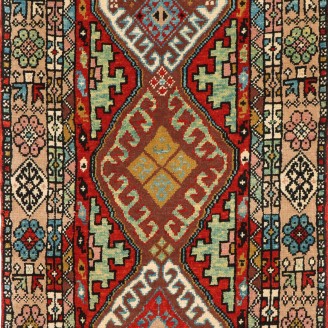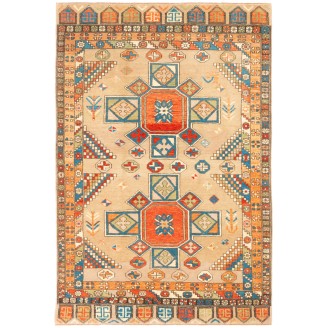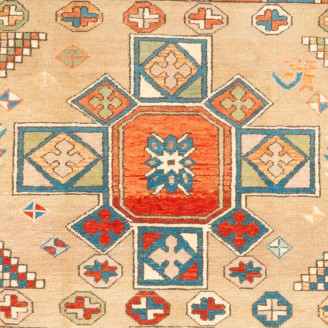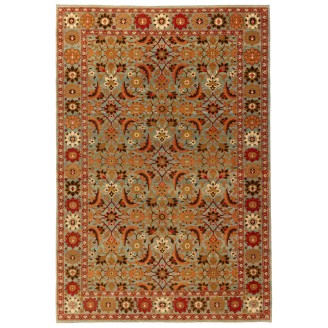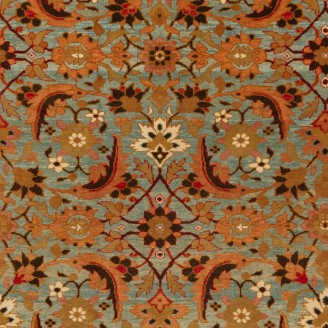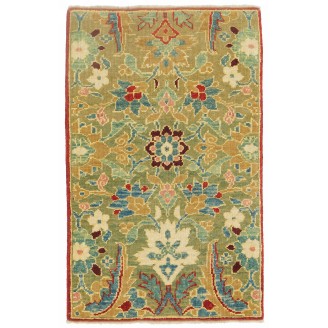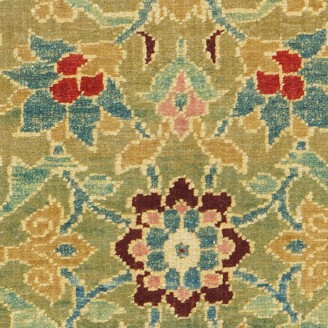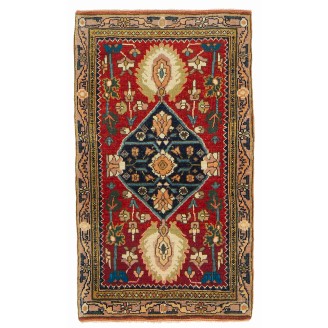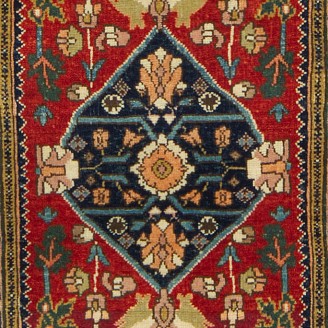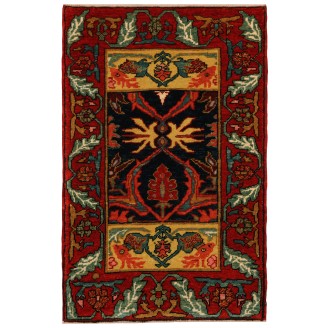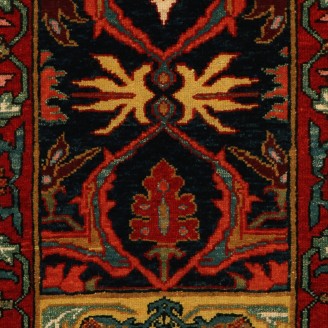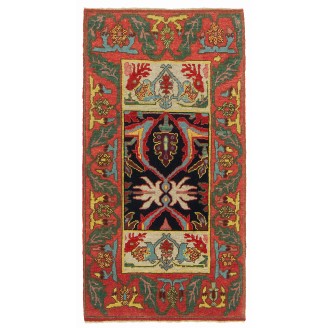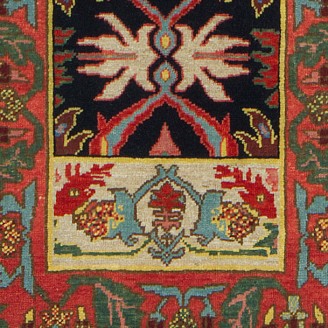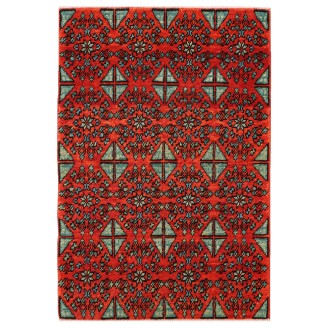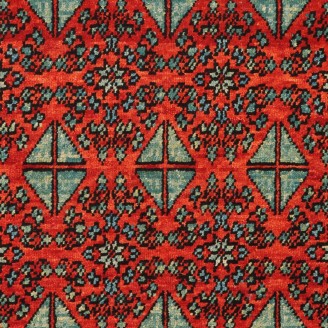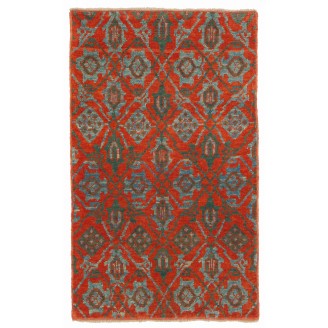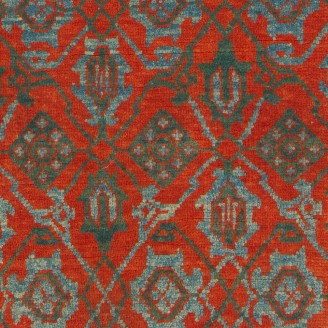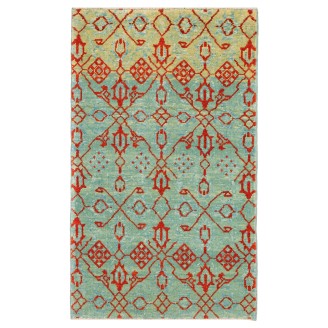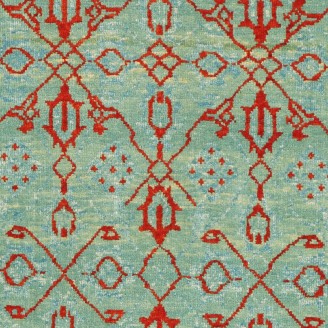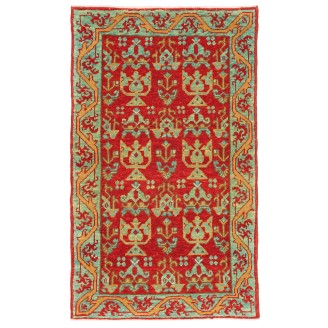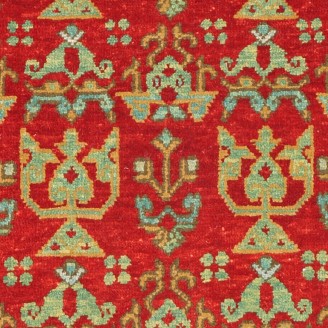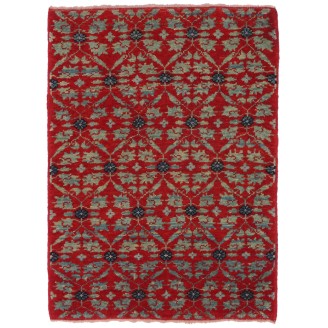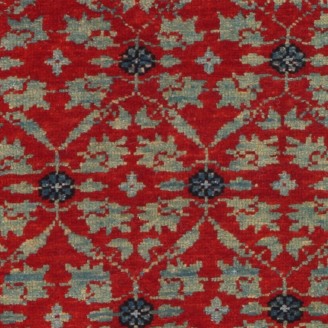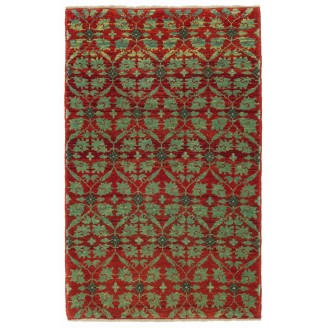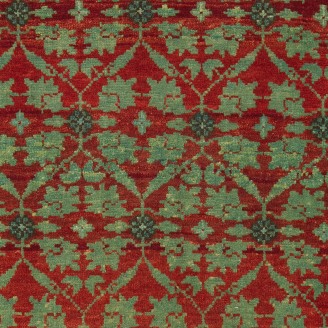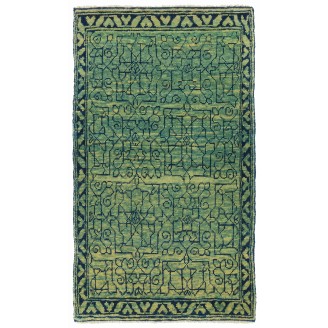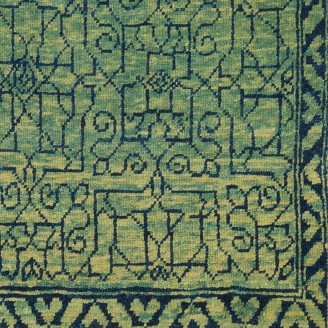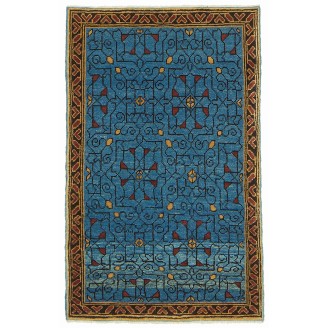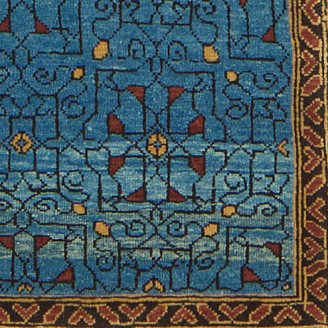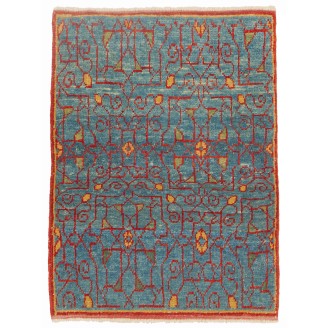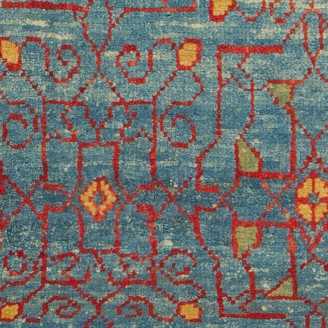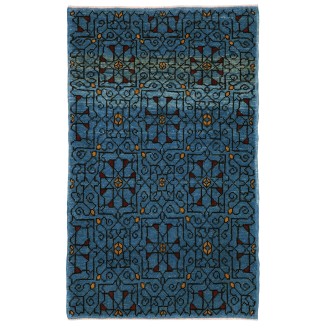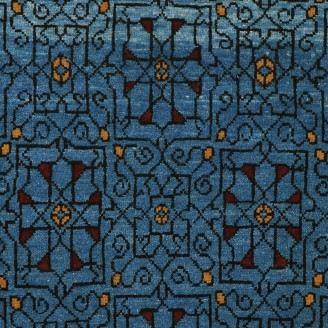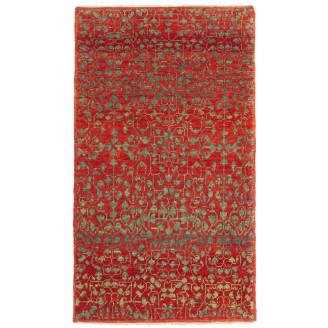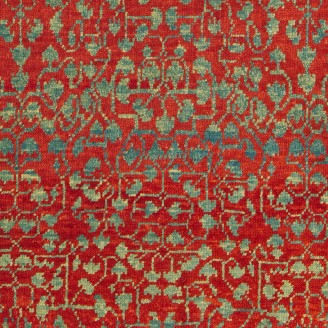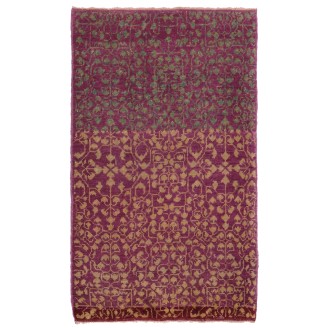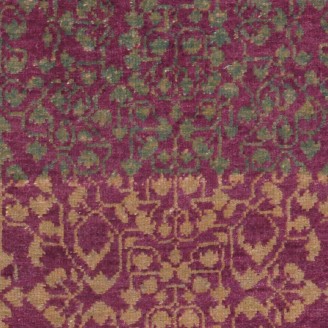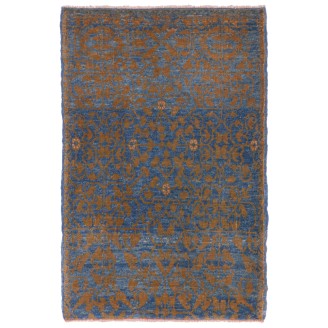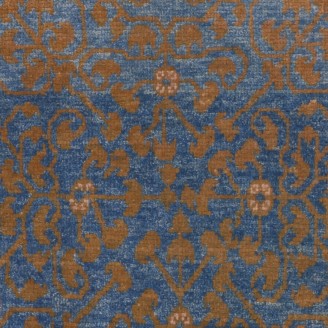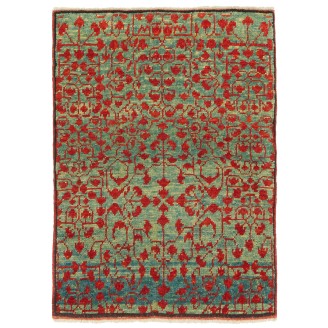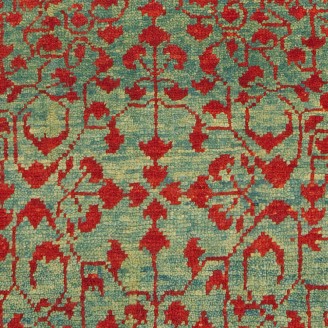Model: ART00075
Dimensions: 1'8" X 4'2"(53cm x 127cm)
This small piece exhibits a forceful design on a small scale in a small area. These kinds of small Turkish yastiks or mats are found which contain an extraordinary amount of power within a very small space. There are large diamond medallions in the center-so large it almost touches the edge of the f..
Price:
$825
Ex Tax:$825
Model: ART00412
Dimensions: 4'2" X 6'2"(128cm x 189cm)
This dual medallion is the main element of the design of the 18th-century carpet from the Konya region, Central Anatolia area of Turkey. Rugs of this type, using two medallions, appear frequently in 15th-century paintings of both the Venetian and the Flemish schools. This pattern tradition survived ..
Price:
$2,700
Ex Tax:$2,700
Model: ART00308
Dimensions: 5'2" X 7'6"(159cm x 231cm)
The source of the rug comes from the book Antique Rugs of Kurdistan A Historical Legacy of Woven Art, James D. Burns, 2002 nr.31. This blue background rug has a variation of masi awita (fish around the lotus) pattern from Senna, Eastern Kurdistan area late 19th century. The field design on this rug ..
Price:
$6,800
Ex Tax:$6,800
Model: ART00212
Dimensions: 1'5" X 2'3"(45cm x 69cm)
The source of the rug comes from the book Antique Rugs of Kurdistan A Historical Legacy of Woven Art, James D. Burns, 2002 nr.31. This blue background rug has a variation of masi awita (fish around the lotus) pattern from Senna, Eastern Kurdistan area late 19th century. The field design on this rug ..
Price:
$850
Ex Tax:$850
Model: ART00101
Dimensions: 1'9" X 3'2"(55cm x 97cm)
The most dramatic of the Gerous ( Garrus, Gerus, Garus ) carpets are those with an "asymmetric" design. Only a section of the original is shown, in the same way, many Lotto carpets were woven. It is difficult to guess the size of these carpets from a photo, but here we enter the area of the "Wagireh..
Price:
$825
Ex Tax:$825
Model: ART00065
Dimensions: 1'8" X 2'7"(53cm x 80cm)
The most dramatic of the Gerous ( Garrus, Gerus, Garus ) carpets are those with an "asymmetric" design. Only a section of the original is shown, in the same way, many Lotto carpets were woven. It is difficult to guess the size of these carpets from a photo, but here we enter the area of the "Wagireh..
Price:
$750
Ex Tax:$750
Model: ART00066
Dimensions: 1'9" X 3'4"(54cm x 103cm)
The most dramatic of the Gerous ( Garrus, Gerus, Garus ) carpets are those with an "asymmetric" design. Only a section of the original is shown, in the same way, many Lotto carpets were woven. It is difficult to guess the size of these carpets from a photo, but here we enter the area of the "Wagireh..
Price:
$825
Ex Tax:$825
Model: ART00199
Dimensions: 1'9" X 2'6"(54cm x 77cm)
The source of carpet comes from the book Völker, Angela, Die Orientalischen Knüpfteppiche das MAK, Vienna: Böhlau, 2001: 42–5. The rug with the central star was designed in the early 16th-century rug by Mamluk Sultane of Cairo, Egypt. It is exhibited at MAK – Museum of Applied Arts, Vienna Austria. ..
Price:
$825
Ex Tax:$825
Model: ART00059
Dimensions: 1'5" X 4'2"(45cm x 127cm)
This lattice pattern is composed of palmettes and leaves filling the various compartments against the imposing ground. One has the impression that it is only part of a larger scheme designed 15th-century rug from the Mamluk era, Cairo region, Eygpt. These designs have often been described as wagireh..
Price:
$825
Ex Tax:$825
Model: ART00083
Dimensions: 1'8" X 2'9"(52cm x 86cm)
This lattice pattern is composed of palmettes and leaves filling the various compartments against the imposing ground. One has the impression that it is only part of a larger scheme designed 15th-century rug from the Mamluk era, Cairo region, Eygpt. These designs have often been described as wagireh..
Price:
$825
Ex Tax:$825
Model: ART00170
Dimensions: 1'8" X 2'10"(53cm x 88cm)
The source of the rug comes from the possession of Endre Unger, which was sold at Sotheby’s in 1992. That rug with the central star was designed in the early 16th-century rug by Mamluk Sultane of Cairo, Egypt. The interpreted design is composed of candelabra Elems and motifs rows filling the various..
Price:
$825
Ex Tax:$825
Model: ART00090
Dimensions: 1'7" X 2'2"(50cm x 68cm)
The source of carpet comes from the book Völker, Angela, Die orientalischen Knüpfteppiche das MAK, Vienna: Böhlau, 2001: 42–5. This rug with the central star was designed in the early 16th-century rug by Mamluk Sultane of Cairo, Egypt. It is exhibited at MAK – Museum of Applied Arts, Vienna Austria...
Price:
$725
Ex Tax:$725
Model: ART00079
Dimensions: 1'10" X 2'10"(56cm x 88cm)
The source of carpet comes from the book Völker, Angela, Die orientalischen Knüpfteppiche das MAK, Vienna: Böhlau, 2001: 42–5. This rug with the central star was designed in the early 16th-century rug by Mamluk Sultane of Cairo, Egypt. It is exhibited at MAK – Museum of Applied Arts, Vienna Austria...
Price:
$825
Ex Tax:$825
Model: ART00097
Dimensions: 1'6" X 2'9"(48cm x 84cm)
The source of the rug comes from the possession of Endre Unger, which was sold at Sotheby’s in 1992. That rug with the central star was designed in the early 16th-century rug by Mamluk Sultane of Cairo, Egypt. The interpreted design is composed of Jerrehian rug's border motifs lattice, covering the ..
Price:
$825
Ex Tax:$825
Model: ART00158
Dimensions: 1'7" X 2'7"(50cm x 81cm)
The source of the rug comes from the possession of Endre Unger, which was sold at Sotheby’s in 1992. That rug with the central star was designed in the early 16th-century rug by Mamluk Sultane of Cairo, Egypt. The interpreted design is composed of Jerrehian rug's border motifs lattice, covering the ..
Price:
$825
Ex Tax:$825
Model: ART00111
Dimensions: 1'5" X 1'11"(44cm x 59cm)
The source of the rug comes from the possession of Endre Unger, which was sold at Sotheby’s in 1992. That rug with the central star was designed in the early 16th-century rug by Mamluk Sultane of Cairo, Egypt. The interpreted design is composed of Jerrehian rug's border motifs lattice, covering the ..
Price:
$400
Ex Tax:$400
Model: ART00157
Dimensions: 1'7" X 2'7"(50cm x 81cm)
The source of the rug comes from the possession of Endre Unger, which was sold at Sotheby’s in 1992. That rug with the central star was designed in the early 16th-century rug by Mamluk Sultane of Cairo, Egypt. The interpreted design is composed of Jerrehian rug's border motifs lattice, covering the ..
Price:
$825
Ex Tax:$825
Model: ART00114
Dimensions: 1'9" X 3'1"(55cm x 95cm)
The source of carpet comes from the book Völker, Angela, Die orientalischen Knüpfteppiche das MAK, Vienna: Böhlau, 2001: 42–5. That rug with the central star was designed in the early 16th-century rug by Mamluk Sultane of Cairo, Egypt. It is exhibited at MAK – Museum of Applied Arts, Vienna Austria...
Price:
$825
Ex Tax:$825
Model: ART00134
Dimensions: 1'7" X 2'8"(50cm x 82cm)
The source of carpet comes from the book Völker, Angela, Die orientalischen Knüpfteppiche das MAK, Vienna: Böhlau, 2001: 42–5. That rug with the central star was designed in the early 16th-century rug by Mamluk Sultane of Cairo, Egypt. It is exhibited at MAK – Museum of Applied Arts, Vienna Austria...
Price:
$825
Ex Tax:$825
Model: ART00165
Dimensions: 1'8" X 2'5"(51cm x 75cm)
The source of carpet comes from the book Völker, Angela, Die orientalischen Knüpfteppiche das MAK, Vienna: Böhlau, 2001: 42–5. That rug with the central star was designed in the early 16th-century rug by Mamluk Sultane of Cairo, Egypt. It is exhibited at MAK – Museum of Applied Arts, Vienna Austria...
Price:
$825
Ex Tax:$825
Model: ART00116
Dimensions: 1'5" X 1'11"(44cm x 60cm)
The source of carpet comes from the book Völker, Angela, Die orientalischen Knüpfteppiche das MAK, Vienna: Böhlau, 2001: 42–5. That rug with the central star was designed in the early 16th-century rug by Mamluk Sultane of Cairo, Egypt. It is exhibited at MAK – Museum of Applied Arts, Vienna Austria...
Price:
$825
Ex Tax:$825
